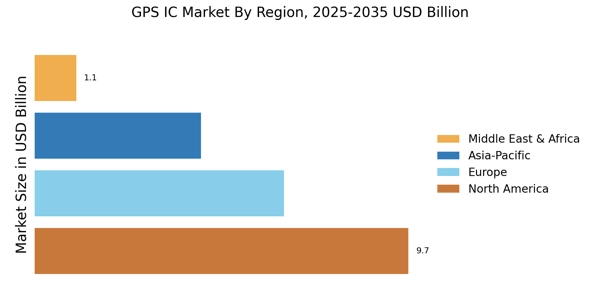Growth in Consumer Electronics
The consumer electronics sector is experiencing a notable expansion, which appears to be a significant driver for the GPS IC Market. With the increasing adoption of smartphones, wearables, and other connected devices, the need for precise location tracking is more pronounced than ever. In 2025, the market for consumer electronics is projected to reach over 1 trillion USD, with GPS functionality becoming a standard feature in many devices. This trend is particularly evident in fitness trackers and smartwatches, where GPS capabilities enhance user experience by providing accurate activity tracking. As manufacturers continue to innovate and integrate GPS technology into their products, the GPS IC Market is poised for substantial growth.
Emergence of Autonomous Vehicles
The advent of autonomous vehicles is poised to revolutionize the transportation landscape, serving as a critical driver for the GPS IC Market. As automotive manufacturers invest heavily in self-driving technology, the demand for precise and reliable GPS systems is escalating. In 2025, the autonomous vehicle market is expected to exceed 60 billion USD, with GPS technology being a fundamental component for navigation and positioning. These vehicles rely on GPS data to make real-time decisions, ensuring safety and efficiency on the roads. Consequently, the GPS IC Market is likely to benefit from this trend, as advancements in GPS technology are essential for the successful deployment of autonomous driving solutions.
Expansion of Smart City Initiatives
The ongoing development of smart city initiatives is likely to bolster the GPS IC Market. Urban planners and governments are increasingly investing in technologies that enhance urban living, including intelligent transportation systems that rely heavily on GPS technology. In 2025, the smart city market is expected to surpass 500 billion USD, with a substantial portion allocated to transportation and mobility solutions. GPS ICs play a crucial role in these systems, enabling real-time traffic management, public transportation optimization, and emergency response coordination. As cities strive to become more efficient and sustainable, the integration of GPS technology into urban infrastructure is anticipated to grow, thereby driving demand within the GPS IC Market.
Rising Demand for Navigation Systems
The increasing reliance on navigation systems across various sectors appears to be a primary driver for the GPS IC Market. As consumers and businesses seek more efficient ways to navigate, the demand for GPS-enabled devices is surging. In 2025, the market for navigation systems is projected to reach approximately 30 billion USD, indicating a robust growth trajectory. This trend is particularly evident in the automotive sector, where GPS technology is integral to advanced driver-assistance systems (ADAS). The proliferation of ride-sharing services and logistics companies further fuels this demand, as accurate location tracking becomes essential for operational efficiency. Consequently, the GPS IC Market is likely to experience significant growth as manufacturers strive to meet the evolving needs of consumers and businesses alike.
Increased Focus on Location-Based Services
The growing emphasis on location-based services (LBS) is emerging as a pivotal driver for the GPS IC Market. Businesses across various sectors, including retail, healthcare, and logistics, are increasingly leveraging LBS to enhance customer engagement and operational efficiency. In 2025, the LBS market is projected to reach approximately 40 billion USD, highlighting the rising importance of location data in decision-making processes. GPS technology is integral to these services, enabling businesses to provide personalized experiences and optimize resource allocation. As the demand for LBS continues to rise, the GPS IC Market is expected to expand, driven by the need for advanced GPS solutions that cater to diverse applications.
















